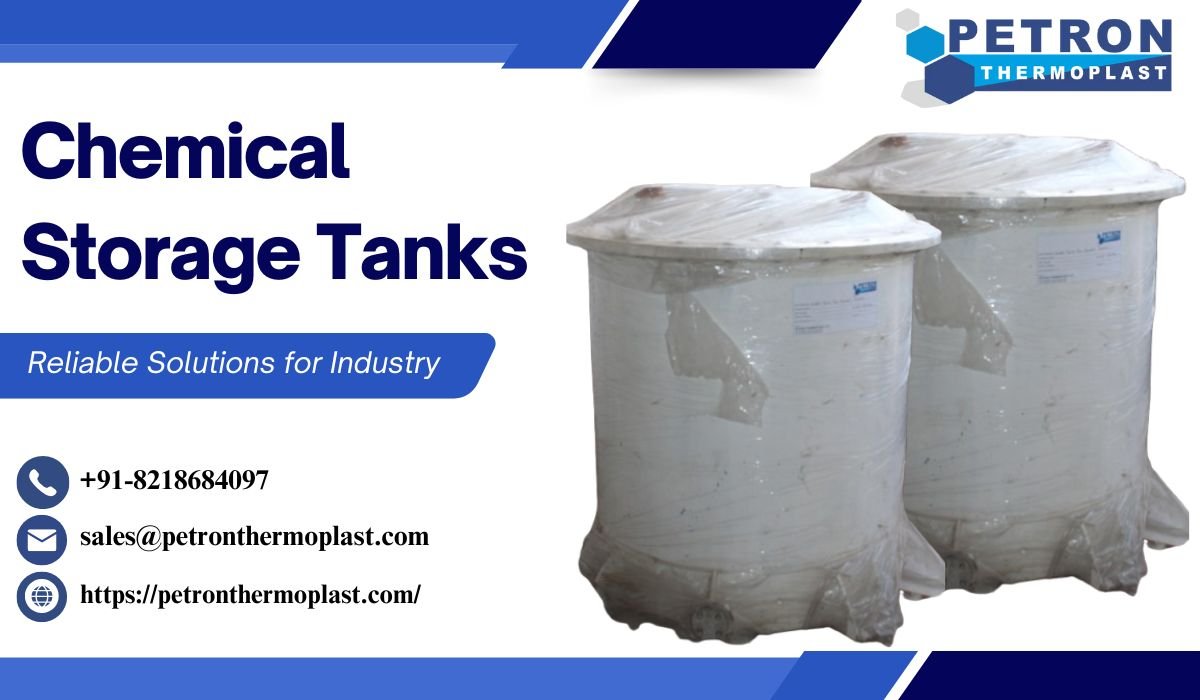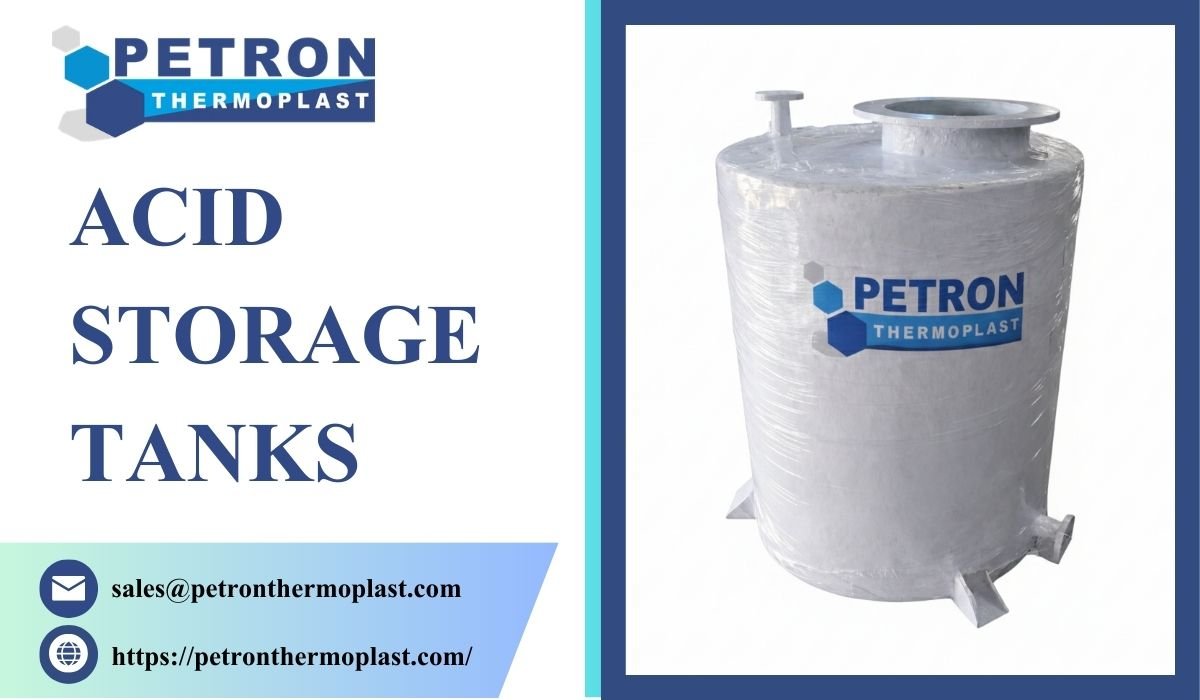In modern industrial operations, the safe and efficient storage of chemicals is a critical requirement. From chemical processing plants to water treatment facilities, oil refineries, and manufacturing units, chemical storage tanks are essential for safeguarding materials, ensuring process efficiency, and maintaining safety standards. Choosing the right chemical tanks can significantly impact operational reliability, product quality, and compliance with environmental and safety regulations.
This blog explores the importance of chemical storage tanks, the different types available, material selection, benefits, and how Petron Thermoplast delivers reliable chemical storage solutions for various industries.
Importance of Chemical Storage Tanks in Industry
Chemicals—whether corrosive, flammable, toxic, or reactive—require specialized storage systems that can handle harsh conditions. Inadequate or improper storage can lead to chemical degradation, spills, safety hazards, and environmental damage.
Key functions of chemical tanks include:
- Safe Containment – Prevents leaks, spills, and contamination.
- Process Efficiency – Ensures uninterrupted production by providing a ready supply of chemicals.
- Compliance – Meets regulatory requirements for chemical handling and storage.
- Durability – Designed to withstand long-term exposure to aggressive chemicals.
We Provide Different Types of Chemical Storage Tanks
Different industries require different tank designs depending on the type of chemical, storage capacity, location, and operating conditions. The main types include:
- PPH Chemical Tank
Polypropylene Homopolymer (PPH) chemical tanks are ideal for storing highly corrosive chemicals at elevated temperatures. They are commonly used in electroplating, galvanizing, and chemical manufacturing plants.
- PVDF Chemical Tank
Polyvinylidene Fluoride (PVDF) tanks are engineered for extreme chemical resistance and high purity applications, especially in pharmaceuticals and semiconductor industries.
- PP FRP Storage Tank
Polypropylene (PP) FRP tanks combine the chemical resistance of polypropylene with the strength of fiber-reinforced plastic. These tanks are lightweight yet extremely durable.
- PP Pickling Tank
Designed for metal surface treatment industries, PP pickling tanks handle acidic solutions used in cleaning and surface preparation.
- PVDF FRP Tank
A combination of PVDF lining and FRP reinforcement offers maximum chemical protection with mechanical strength. Perfect for industries dealing with hazardous acids and solvents.
- PP Rinsing Tank
PP rinsing tanks are commonly used in metal finishing, plating, and chemical rinsing processes. They ensure a clean and safe environment for rinsing components.
- HCL Storage Tank
HCL (Hydrochloric Acid) storage tanks are specially built to handle the corrosive nature of hydrochloric acid without degrading.
- Acid Storage Tank
Our acid storage tanks can store a wide range of industrial acids, including sulfuric, nitric, phosphoric, and hydrochloric acids.
- FRP Storage Tank
FRP (Fiber Reinforced Plastic) tanks are widely used for storing chemicals in outdoor environments, thanks to their weather and UV resistance.
- Sulfuric Acid Storage Tank
Sulfuric acid is one of the most aggressive industrial chemicals, requiring specially engineered storage solutions. Our sulfuric acid storage tanks provide ultimate safety and durability.
Materials Used in Chemical Tanks
The choice of material is critical to ensure compatibility with the stored chemical. Common materials include:
- Polyethylene (PE) Tanks
- Cost-effective, lightweight, and corrosion-resistant.
- Suitable for a wide range of acids, alkalis, and solvents.
- Polypropylene (PP) Tanks
- Higher temperature resistance compared to PE.
- Great for chemical processing plants.
- PVDF (Polyvinylidene Fluoride) Tanks
- Exceptional chemical resistance.
- Suitable for high-purity chemical storage.
- FRP (Fiberglass Reinforced Plastic) Tanks
- High strength-to-weight ratio.
- Resistant to UV exposure and corrosion.
- Stainless Steel Tanks
- High durability and mechanical strength.
- Ideal for food-grade and pharmaceutical chemicals.
Key Features of Reliable Chemical Storage Tanks
A good chemical tank must have design and performance features that ensure safety and longevity. Some critical features include:
- Corrosion Resistance – Prevents material degradation over time.
- Leak-Proof Construction – Ensures zero chemical loss and environmental safety.
- UV Protection – Extends lifespan for outdoor installations.
- Temperature Resistance – Handles chemicals at varying operating temperatures.
- Custom Design Options – Built to specific industry needs.
Applications of Chemical Storage Tanks in Industry
Chemical tanks are essential across multiple industrial sectors, including:
- Chemical Processing Plants – Storage of acids, bases, and solvents.
- Water Treatment Facilities – Storage of chlorine, ferric chloride, and other treatment chemicals.
- Oil & Gas Industry – Containment of petroleum products and corrosive fluids.
- Pharmaceutical Industry – Storage of high-purity liquids and active ingredients.
- Food & Beverage – Safe containment of food-grade chemicals and cleaning agents.
- Agriculture – Fertilizer and pesticide storage.
Benefits of Choosing High-Quality Chemical Storage Tanks
- Safety Assurance
Prevents leaks, spills, and accidents, protecting workers and the environment.
- Cost Efficiency
Durable tanks reduce maintenance costs and replacement frequency.
- Regulatory Compliance
Meets global safety and environmental standards.
- Operational Reliability
Provides consistent supply of chemicals to keep production running smoothly.
- Customization
Tanks can be designed to fit exact operational needs.
Petron Thermoplast – Your Trusted Partner for Chemical Storage Solutions
At Petron Thermoplast, we specialize in providing premium-grade chemical storage tanks tailored to diverse industrial needs. Our tanks are manufactured using high-performance materials and precision engineering techniques to ensure maximum safety, durability, and efficiency.
Why Choose Petron Thermoplast Chemical Tanks?
- Wide range of materials: PE, PP, PVDF, FRP, Stainless Steel.
- Custom sizes and configurations.
- Corrosion-resistant designs for long service life.
- Compliance with industry standards.
- Expert consultation for material compatibility.
Conclusion
Chemical storage tanks are more than just containers—they are vital safety components in any industrial system. By choosing high-quality tanks that meet the specific requirements of your chemicals, you can ensure long-term operational reliability, safety, and compliance. With Petron Thermoplast advanced chemical storage solutions, you can be confident that your chemicals are stored securely, efficiently, and in full compliance with industry standards.












Leave a Reply